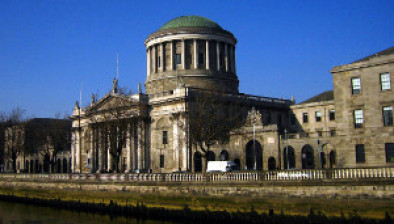NI: Family migration rules amended in line with devolution deal
Family migration rules have been amended for people in Northern Ireland in line with the deal struck in January to restore devolution.
Under the new immigration rules, family members of British or dual British-Irish citizens from Northern Ireland will be able to apply for status under the EU settlement scheme.
The changes have been cautiously welcomed by immigration lawyers, as well as campaigner Emma DeSouza, who has been involved in a high-profile, years-long battle with the Home Office over the immigration rules.
Mrs DeSouza’s US-born husband Jake applied in 2015 for a residence card as the spouse of an EEA national, but was refused on the basis that she did not fall within the definition of “EEA national” as a “national of an EEA state who is not also a British citizen”.
She has argued, however, that this comes into conflict with the Good Friday Agreement, which sets out “the birthright of all the people of Northern Ireland to identify themselves and be accepted as Irish or British or both, as they may so choose”.
An immigration tribunal found in favour of the couple in 2017, but the decision was overturned by the Upper Tribunal (Immigration and Asylum Chamber) last October.
The tribunal said that the birthright to be “Irish or British, or both” contained in the Good Friday Agreement, “whilst binding in international law, does not thereby make it binding under the domestic law of the United Kingdom”.
While welcoming the changes, Mrs DeSouza warned they were effectively “time-limited” as the EU settlement scheme would close after the transition period, and they did not “address the wider citizenship and identity issues that our case has uncovered”.
She continued: “The failure of the British Government to give domestic legal effect to the birthright provisions of the Good Friday Agreement remains, and our unique right to be accepted as such is not represented in domestic paper, policy and practice - this has to change.
“The Government has conceded on the principle by bringing forth these changes, we now need them to go the extra mile and fulfil their obligations to the people of Northern Ireland. Without addressing the wider gap in legislation these changes, whilst enormously welcomed, may well be no more than a sticky plaster.
“We will be consulting with our legal team in regards to our ongoing legal challenge which is presently due to be reviewed by the Court of Appeal of Northern Ireland on June 25th.
“We want to thank our legal team, Robert Croskery from MSM Law, Helena Wilson and Ronan Lavery QC as well as Ireland’s Department of Foreign Affairs and all those who have supported us in this challenge.”
Ashleigh Garcia, immigration solicitor at Law Centre NI, said: “The impact of these changes cannot be overstated. Currently, family members of people from Northern Ireland have to meet financial and English language requirements, which often result in prolonged separation from their UK sponsor. Many also struggle with the cost for a family visa.
“The application process under the EU settlement scheme is also more flexible, allowing people to count years they have already spent in the UK, and allows for a longer continuous absence.
“The changes will essentially put ‘relevant’ citizens of Northern Ireland and their family members on a par with Irish citizens from the Republic of Ireland, as was the case prior to a 2011 Supreme Court judgement.”
She added: “The definition of a ‘relevant’ person has been drafted to strictly reflect the terms of the Good Friday Agreement. Therefore, the benefits of the changes are contingent on the sponsor having been born in Northern Ireland, meaning that anyone born in other parts of the UK or overseas will be excluded. This is likely to raise issues of proportionality and discrimination between UK citizens.”









